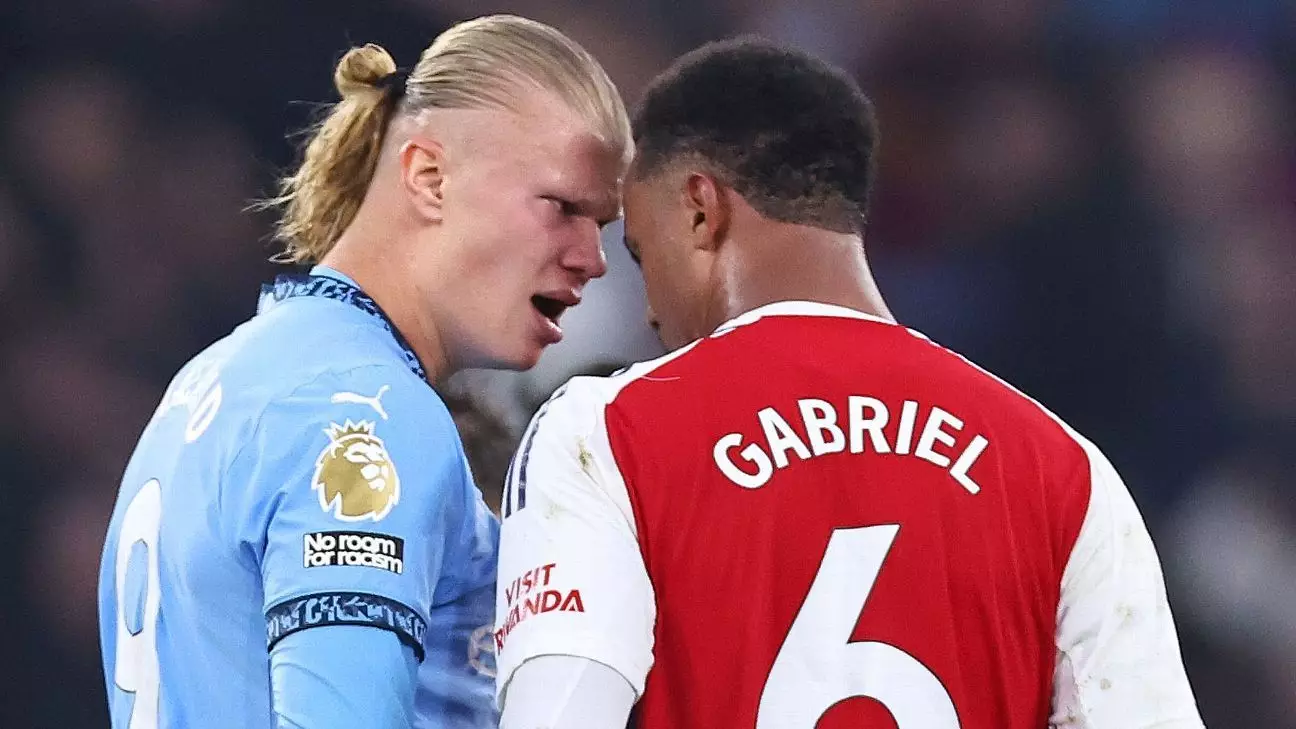On a dramatic Sunday in Manchester, a classic encounter unfolded as Manchester City and Arsenal battled to a tense 2-2 draw at the Etihad Stadium. With John Stones scoring a last-gasp equalizer deep into stoppage time, the match showcased the intensity and unpredictability inherent in the Premier League. This particular fixture highlighted the fierce competition between two of the league’s top clubs, set against the backdrop of both tactical battles and spirited individual performances.
The game ignited right from the onset with Erling Haaland, who marked a significant milestone by scoring his 100th goal for City, putting the home team ahead within the first ten minutes. This early strike seemed to set the tone for a cavalcade of goals and set City firmly on the attack. However, Arsenal, displaying resilience, responded with two quick-fire goals. Riccardo Calafiori, making his league debut, scored a stunning left-footed shot, igniting the hopes of the traveling Gunners’ fans. Just moments before halftime, Gabriel Magalhães capitalized on a corner delivered by Bukayo Saka, flipping the script on City as he sent the ball past the home goalkeeper.
As Arsenal took the lead, tactical adjustments became critical. The turning point of the match occurred when Leandro Trossard received a controversial second yellow card for kicking the ball away after a foul on Bernardo Silva. This dismissal left Arsenal a man down for the entire second half, forcing Mikel Arteta to adjust his strategy. While he had aimed to press for an away win, the red card necessitated a more defensive formation, effectively turning the Gunners into a counter-attacking side.
The second half was characterized by Arsenal’s backs-against-the-wall mentality as they sought to absorb relentless pressure from City. Despite being outnumbered, the Gunners displayed a commendable tactical discipline, forming a compact defensive block that stifled City’s attempts to penetrate their goal. It was a test of mental fortitude as the team faced wave after wave of City’s attacks, with the home side taking a staggering 20 shots to Arsenal’s none during this period.
Arteta’s players were forced into harrowing defensive positions, relying on the grit and heart displayed throughout the match. Yet, as the clock ticked down, doubts began to creep in for Arsenal fans. The fear of a devastating late collapse loomed large, especially given City’s history of late goals under Pep Guardiola. Just when it appeared that Arsenal would cling on for a memorable victory, disaster struck. In the dying moments of the match, Stones slotted the ball home after a scramble in the box from a corner, ensuring that City’s title credentials remained intact.
The match also reignited discussions around the arbitrary enforcement of yellow cards for time-wasting scenarios. Arsenal’s disciplinary record under Arteta is historically poor; since his arrival, the Gunners have seen numerous players sent off for offenses that often appear to go unpunished in other games. The inconsistency of officiating procedures means clubs like Arsenal are held to a higher standard of discipline, leaving many supporters frustrated.
Arteta’s tactical decisions, particularly his management of Trossard, also came under scrutiny. While his decisions to field Calafiori were commendable given the player’s debut, the ramifications of Trossard’s expulsion forced a reactive rather than proactive strategy. The game reiterated the importance of adaptability in football; had Trossard remained on the pitch, Arsenal could potentially have maintained a more assertive approach, rather than retreating into a defensive shell.
From Pep Guardiola’s perspective, the coach was once again reminded of the tactical nuances that can turn victory into disappointment. The failure to capitalize on City’s numerical advantage early in the second half highlights the unpredictability of the game. City’s penchant for over-reliance on shots from distance, particularly in the absence of creative midfield threats, may have been influenced by Rodri’s exit due to injury. His absence left a notable gap in the midfield, affecting both the team’s connectivity and creativity.
Despite the late equalizer, City must reflect on their inability to break down a resilient ten-man Arsenal side. The game encapsulated a broader narrative of the Premier League – where tactical battles can prove as crucial as individual brilliance.
While the final score may reflect a stalemate, the match illustrated the spirit and determination within both squads. Arsenal, ready to challenge City for supremacy, have shown they can stand toe-to-toe with the champions. Meanwhile, Manchester City faces the urgent task of refining their approach if they are to maintain their dominance amid emerging challenges.

Leave a Reply